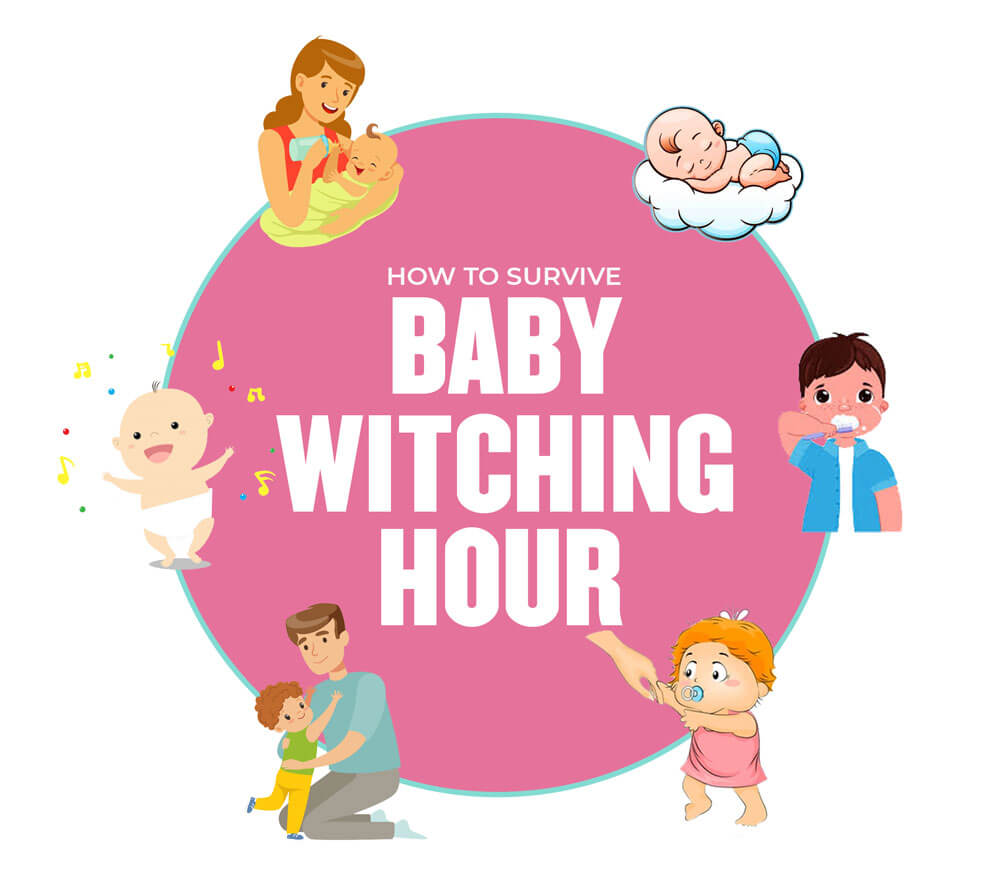What is the Witching Hour | Causes & Solution

You may have heard of the term “witching hour” going around a lot, especially with new parents. If you’d only ever heard of this term in stories, then the witching hour in babies is a pretty similar experience. As a new parent, it is one of the many hurdles that you’ll have to cross in order to have a healthy and happy baby on your hands.
If your baby has unexplainable periods of loud crying during odd hours of the day, then they’re possibly going through the witching hour period and you’ll need to follow a few steps in order to get the witching hour period done as quickly as possible. But first, let’s understand what is the witching hour and what time is the witching hour so you know when to expect it.
What is the Witching Hour?
The witching hour may refer to a specific time of the day when your baby is simply the fussiest and cannot be calmed down no matter what you do. As for the question of when is the witching hour, it can range anywhere from the late afternoon to the night.
This time of the day may seem daunting, especially for new parents, since this is the time of the day when you finally can sneak in those few hours of sleep before you have to rush after taking care of your baby once again.
As with the origins of the name, the witching hour for babies can happen often in the dead of the night – and while it was originally denoted as the time of the day when evil spirits were at their most active, this experience is not very dissimilar either.
What Causes Witching Hour in Newborns?
There are several reasons why your baby may be going through the witching hour – and to reassure you – no, your baby is not the only one who is going through this. There are several reasons why this happens as a phenomenon to babies all across the globe – and you’ll be glad to know that there are indeed ways you can calm your baby down when they’re in the midst of the witching hour. Let’s get into the reasons why your baby is going through the newborn witching hour.
1. Overtired

Babies, till they’re around 12 weeks old, are extremely difficult to calm down once they’re overtired. An overtired baby, to the contrary of being sleepy and exhausted, may just display the opposite symptoms.
They may begin to cry uncontrollably because they have the hormones of adrenaline and cortisol running through their body – and as you may know, these hormones do the opposite of tiring out your baby.
They activate the fight-or-flight response in your baby which essentially makes them absolutely unable to fall asleep even though they might be exhausted. This invariably leads to the witching hour fussing during late afternoon or evening.
2. Hustle and Bustle

This is one of the factors that could lead to the above reason for the witching hour happening to your baby, and it’s something that may not be entirely within your control either. The hustle and bustle of your household may be something that bothers your baby – and it may occur at the very specific time of early evening or late afternoon.
Preparing food, having your partner come back home – all of these can easily affect your baby’s sleeping patterns and rouse them sufficiently so that they may start crying due to being overstimulated.
3. Baby is Hungry

The most natural reason for your witching hour baby may just be that your baby is hungry. Especially if your baby is breastfed – since this can give rise to the problem of the low levels of prolactin in lactating individuals. If your baby is hungry but they’re not getting fed quickly enough, then it is understandable that your baby is frustrated.
This can usually occur during the end of the day, which is close to the witching hour so it is a definite reason why your baby may be fussy during the late afternoon and evening. So ensure your baby is not hungry by following a few simple steps such as cluster feeding.
4. Busy Routine

This falls directly in line with the hustle and bustle reason stated earlier. Your baby may want to be attended to more during the busy routine that you have set in place – and when stuff picks up the pace around your household, it may easily perturb your baby.
They may then begin to seek you out and thus overall become fussy and begin to cry a lot in an inconsolable manner. So notice if there is any correlation between your baby’s crying fits and things getting busy in your household – because there is indeed a large chance that these events may be related.
5. Growth Spurts

Lastly, it may be possible that your baby is experiencing several growth spurts – these are fairly frequent especially in the first year of your baby’s life, and they can have these growth spurts at varying developmental milestones such as when they’re a couple of weeks old, then three months, and then lastly six months old.
And you know what growth spurts mean for the baby – they start to have a bigger appetite than before and maybe constantly cranky. You’ll need to be feeding your baby more frequently than before and lengthening their feeding sessions as well – as we know, a hungry baby can lead to witching hours for your entire family.
How to Survive Baby Witching Hour

Luckily, there are a few practices you can implement to survive the dreaded witching hour – and since these things are fairly easy to do as well, you’ll be getting over the witching hour in no time and once again have a constantly content and happy baby with yourself. Let’s get into the simple steps you can take to ensure that the hours of the late afternoon or evening do not become a nightmare for you or your baby.
1. Maintain a Calm Environment
Since you now know that busy routines and the hustle and bustle may affect your baby’s sleeping schedule a lot and cause them to be quite disturbed at the specific time frame of 6 pm to around 10 pm, it is important to maintain a calming environment for your baby to stimulate a sense of routine and peace for your baby.
You can do this through a variety of techniques and it prevents your baby from being overstimulated in case they have too much going on around them. Taking them to a dark room with minimal noise and calming them down there may be an excellent way of maintaining a calm environment.
2. Check your Routine
Remember how we said that overtired babies make for more frequent witching hours? Well, that’s especially true as far as their naptime routine is concerned – you need to be making sure that your baby is not too tired or exhausted and has not missed a nap in the afternoon.
Babies have delicate sleep schedules and can start whining and crying with fervor if they do not get the rest that they need. And while it may seem like a good idea to keep your baby awake for as long as possible to help them sleep better at night – that’s not exactly true with babies and might have the opposite effect.
Also read: Baby Crying in Sleep? Tips to Settle Baby at Night
3. Cluster Feeding
You may have heard this term a couple of times if you’ve got yourself a witching hour baby, but what does cluster feeding really mean? Well, it could be possible that your baby is either going through one of those growth spurt periods we talked about before or could not be getting the adequate amount of calories if they’re breastfed.
Since there’s a lot of prolactin that the baby misses out on during the end of the day, they can start to need cluster feeds throughout the day – meaning many frequent feedings, usually in the span of thirty minutes, so that the baby is well-fed and sleeps longer for the night. If your baby is waking up in the middle of the night then you can even try Dream Feeding.
4. Use White Noise
Soothing for adults and babies alike, there’s something about white noise that will calm your baby down like nothing else. This is a crucial part of preventing overstimulation for your baby – since white noise is often repetitive and peaceful, they can simulate the feeling of the womb for the baby, which is a place that they had grown familiar with and thus feel safe in. Hence, having an app for white noise can help both you and your baby through those witching hours.
5. Take the Baby on a Walk
Going outside is always a refreshing experience for the witching hour babies – and maybe just the thing your baby needs to calm down and stop crying uncontrollably during the witching hour. It may also do wonders for your mental health as well, as it will give you an opportunity to rejuvenate and come back feeling refreshed and ready to tackle the possibly long witching hours ahead of you.
6. Ask for Help
It’s completely normal and even encouraged for you to get some help when your baby is in the throes of the witching hour. Being constantly surrounded with concerns about taking care of the baby may take a toll on you, so it is more than necessary to pass the baton to someone else for a short part of the evening. It can be anyone – a trusted neighbor, relative, or your partner because after all, you’re in this together.
Colic vs Witching Hour
If your baby exhibits all of these symptoms but in a more extreme manner, then you might want to consider the possibility that your baby has colic. A colicky baby displays the symptoms of fussing and crying uncontrollably, but it is also accompanied by signs of them being in physical discomforts – such as them attempting to pull their knees up towards their body, arching back and the like.
Colic is usually caused when the babies get too much milk in their system, hence you can change the way that your baby is fed in order to prevent it. Colic usually lasts in babies till they’re about four months old, and you can help your baby through it by attempting to try a different feeding position such as laying back instead of feeding them upright.
Also read: Grunting Baby Syndrome – Why is your Baby Grunting?
Our Advice
Of course, these are only some of the most common observable symptoms in babies when they’re going through the witching hour. As you have seen, it is indeed simple to take care of a witching hour baby – but more importantly, it is necessary to make sure that you’re not stressed whilst this is happening.
Seeking help from those around you to take a break or going to a lactation consultant to make sure that your baby’s witching hour struggles are normal are the only natural steps to take as a newborn parent. Don’t worry though, this phase will be over sooner than later and you can all enjoy some much-deserved rest in the evenings.

Laura is a trained primary teacher who takes a profound liking in interacting with and bringing out the best in children. She is also an ISSA certified pediatrician with an extensive practice of over 12 years. Laura comprehends the needs of infants and now compresses her expertise into writing thorough parenting guides to aid new parents.


